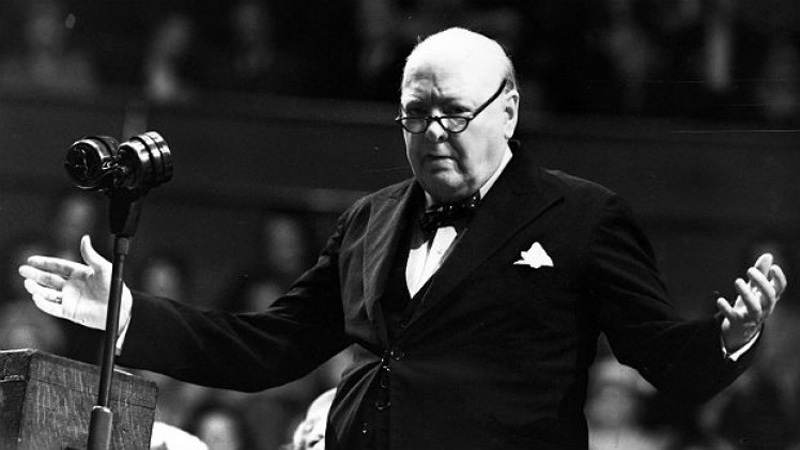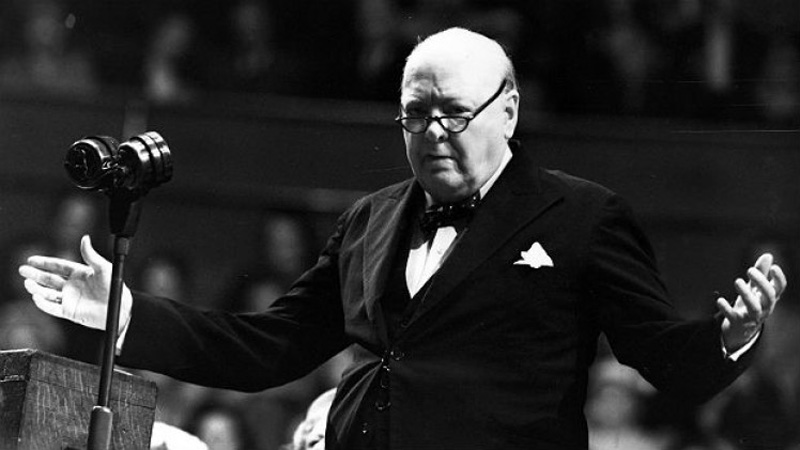
Churchill Society News
Churchill on Trump and Clinton

October 6, 2016
The Churchill’s Centre’s Executive Director weighs on thoughts about the 2016 election in the United States
By LEE POLLOCK
Published in The Wall Street Journal, Oct. 6, 2016 Search the internet for “ Winston Churchill and democracy” and you’ll find a quote attributed to Britain’s great World War II leader: “The best argument against democracy is a five-minute conversation with the average voter.”
Search the internet for “ Winston Churchill and democracy” and you’ll find a quote attributed to Britain’s great World War II leader: “The best argument against democracy is a five-minute conversation with the average voter.”
While that comment—which is actually apocryphal—may resonate among some voters in this highly unusual election year in the U.S., Churchill’s faith in constitutional democracy would never have accommodated such a dystopian view. His equally famous comment (though not original to him)—“Democracy is the worst form of government except all those other forms”—is closer to his real sentiments.
Churchill’s daughter Mary Soames, who died in 2014 after a long life as guardian of her father’s legacy, was skeptical of attempts to invoke his name. “How would you know?” was her retort to “What Winston Would Think.” Even so, it’s tempting to consider what he would make of American politics in 2016.

2024 International Churchill Conference
No foreign statesman had a longer and deeper association with the United States. While he had deep respect for American democracy, Churchill’s relationship with this country was sometimes troubled. In the 1920s he was vexed by America’s international policy, and when his name was floated for Foreign Secretary, his wife Clementine cautioned against it, since his “anti-American views” would, in her mind, make him unsuitable.
Used to the parliamentary system, Churchill could find the quadrennial spectacle of American elections unappealing. When he once was asked about running for president, he replied, facetiously, “All that handshaking of people I didn’t give a damn about would kill me.” Churchill, who met most presidents from William McKinley to Dwight D. Eisenhower, was careful never to publicly endorse a specific candidate. Among presidents, his closest personal relationships were with Democrats Franklin Roosevelt and Harry Truman, as well as Ike, a Republican.
Churchill was above all a leader of principle and conviction, but undogmatic. And while he was famous for witty repartee, his relationships with his adversaries—notably Neville Chamberlain in his own party and Labor’s Clement Attlee—were characterized by respect and civility. (He denied having joked, “An empty taxi drove up to No. 10 Downing Street and Mr. Attlee got out.”) So he would be troubled by America’s reality-TV politics of personal attack and insult. For Churchill, conscience, rectitude and sincerity were the shield with which a nation could “march always in the ranks of honor.”
Whatever happens on Nov. 8 would not have diminished his optimism about the world and the nation he called the “Great Republic.” To whoever is elected president, Churchill would offer words from one of his most famous speeches, at a far darker hour in April 1941: “Westward, look, the land is bright.”
Mr. Pollock is Executive Director of the Churchill Centre
Subscribe
WANT MORE?
Get the Churchill Bulletin delivered to your inbox once a month.


